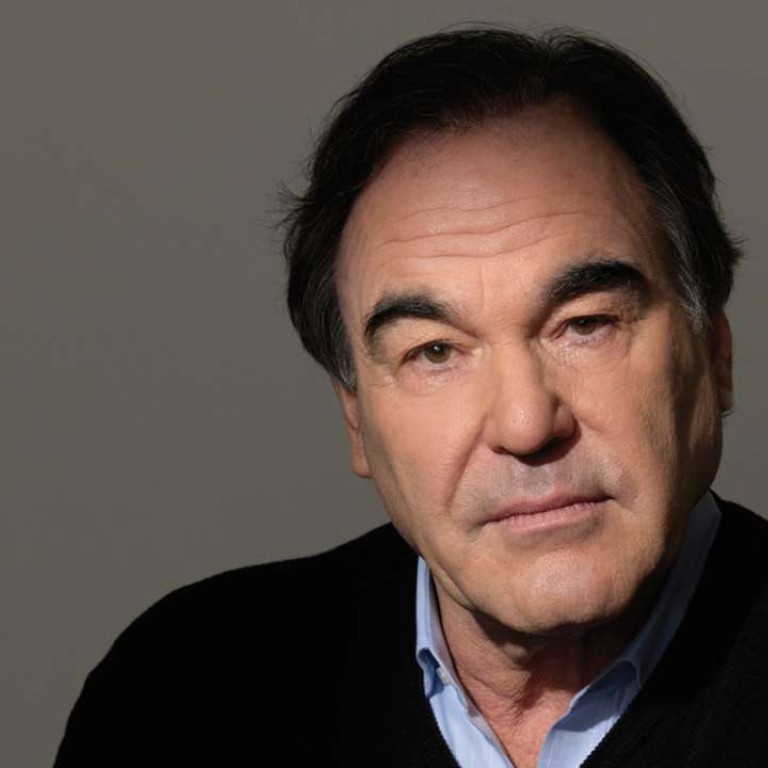
Book review: a fanboy’s love letter to the films of Oliver Stone
Although his recent output might have faltered, Stone had a run of a dozen films in the ’80s and ’90s, from Salvador to Any Given Sunday, that cements his position as a major artist, says critic Matt Zoller Seitz

The Oliver Stone Experience
by Matt Zoller Seitz
Abrams
4 stars
Is there another living American director with a greater run of movies than Oliver Stone? The dozen films he directed over a span of 13 years, from 1986-99, form a body of work unparalleled in contemporary cinema.
They came one after the other – artful provocations, sometimes clouded in disreputable airs, that delved into recent history and modern-day affairs with a defiant ferocity and style: Salvador, Platoon, Wall Street, Talk Radio, Born on the Fourth of July, The Doors, JFK, Heaven & Earth, Natural Born Killers, Nixon, U-Turn and Any Given Sunday.
That stretch of movies brought Stone Oscar glory and Hollywood clout. It also influenced a generation of film buffs and critics, including Matt Zoller Seitz, who describes the streak in the preface to his book The Oliver Stone Experience this way: “It’s hard to describe to somebody who wasn’t alive at the time (and old enough to see R-rated movies – Oliver never made films for kids) how thrilling it was to watch him gain confidence and skill and break fresh ground with each project. His movies were brash, confrontational, sometimes assaultive, often tawdry or nasty, greedily sensual, anti-bourgeois, and fueled by the urgent energy of an artist who wanted to make big statements on subjects that the mainstream preferred to avoid.”

This might sound like Stone, who is now 70, has retired, although of course he hasn’t. His more recent films (Savages, Wall Street 2: Money Never Sleeps, W) haven’t had the impact his earlier work did, but his artistic fire remains. His latest movie, Snowden, stars Joseph Gordon-Levitt as Edward Snowden, the NSA whistle-blower who revealed the extent of the invasion of privacy the US government had resorted to post-9/11.
Watch: “Snowden” director, cast attend Munich film premiere
Snowden is discussed in the last chapter of The Oliver Stone Experience: Seitz links the film to the theme of The Beast, or the military-industrial complex, that recurs throughout Stone’s work. But most of the 480 pages of this massive, 3kg volume, which you don’t so much read as spend time with, are devoted to Stone’s life and career.

The bulk of the book is question-and-answer conversations between Seitz and Stone, drawn from more than 100 hours of interviews conducted from 2011-15, that cover everything from Stone’s childhood to his tour of duty in Vietnam; his film school education at NYU (Martin Scorsese was one of his professors) to his early work as a screenwriter (including Scarface, Year of the Dragon and Midnight Express, for which he won his first Oscar).
Stone can be a prickly interview subject, but he’s also an uncommonly eloquent and informed artist who doesn’t back down from his opinions. When Seitz asks him about a controversial statement he made during a public panel discussion in New York city shortly after 9/11 in which he compared the attack to “a French revolution moment”, Stone replies “I was on a stage and I was impassioned, but I meant those words. There’s nothing false in what I said.”

Despite all the criticism he’s withstood throughout his career, Stone often comes off as surprisingly humble and vulnerable, although he doesn’t shy away from disagreement (on Seitz’s interpretation of Talk Radio: “You can criticise the movie, call it a five-finger exercise or whatever the f *** you call it later in the book. But at least try to understand what we’re trying to do.”)
Seitz spars with Stone about his portrayal of women in his early pictures, dives deep into the director’s editing techniques and use of film grammar, and explores the autobiographical strands in his movies.
But what shines through brightest in The Oliver Stone Experience is Seitz’s profound admiration and respect for Stone’s work and, by extension, the man. The best critics are able to express how a piece of art affects their lives – they can personalise something by connecting with it on an emotional or intellectual level – and this lavish, beautiful book is as much a piece of serious criticism as it is an expression of pure movie love.
When Stone tells Seitz he’s having a hard time picturing what kind of shape the finished book will take, Seitz tells him: “It’s an Oliver Stone movie about Oliver Stone, but in the form of a book.” The Oliver Stone Experience turns out to be just that, complete with mysteriously redacted text like the Warren Commission report, gorgeous visuals, a sweeping sense of history and a bombshell revelation about the JFK assassination that Seitz saves for the final page – a last-minute plot twist before the credits roll.

